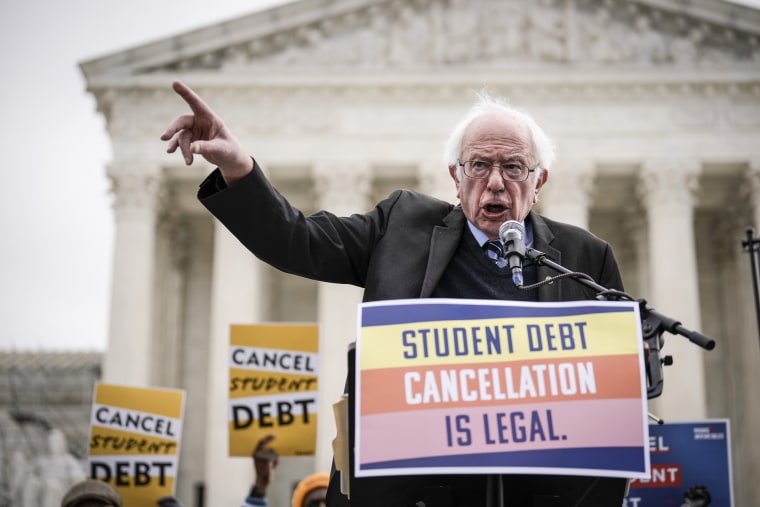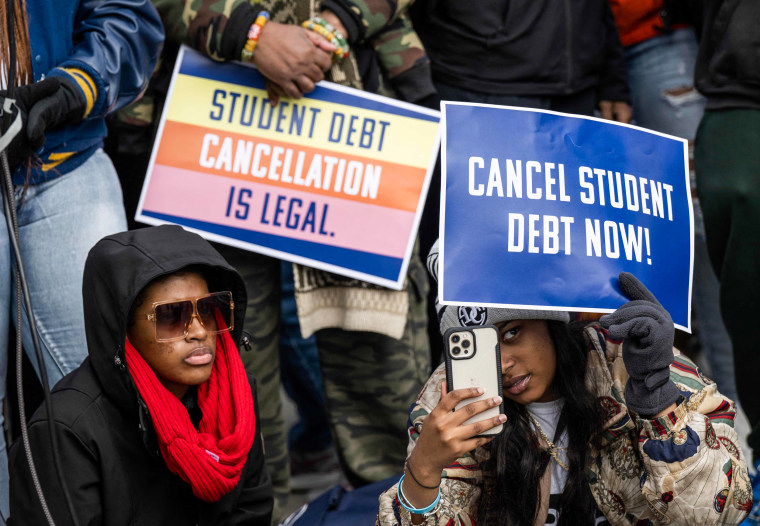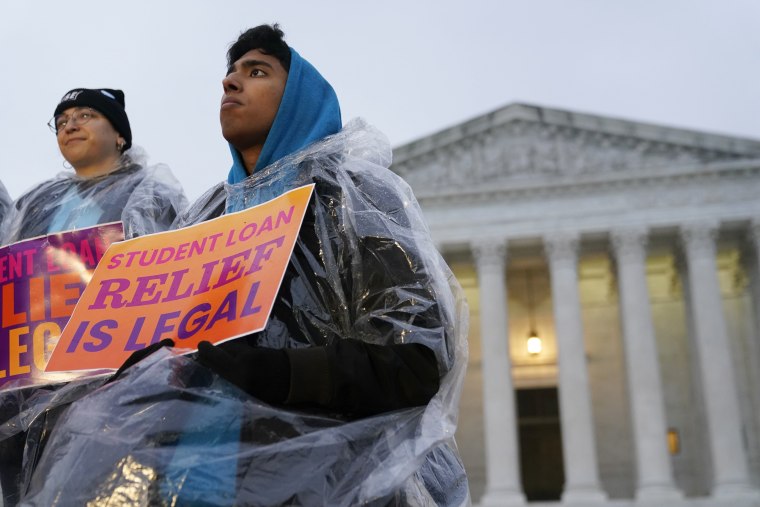WASHINGTON — Conservative Supreme Court justices appeared skeptical Tuesday about the legality of President Joe Biden's student loan debt relief plan, although questions remain about whether the challengers have legal standing to sue.
The program, which would allow eligible borrowers to cancel up to $20,000 in debt, has been blocked since the 8th U.S. Circuit Court of Appeals issued a temporary hold in October, and there are major doubts it will ever go into effect.
The court heard arguments in two cases, one brought by six states, including Missouri, and the other brought by two people who hold student loan debt, Myra Brown and Alexander Taylor.
The challengers argue that the administration’s proposal — announced by Biden in August and originally scheduled to take effect last fall — violates the Constitution and federal law, partly because it circumvents Congress, which they said has the sole power to create laws related to student loan forgiveness.
Conservative justices indicated they could decide the case based on a legal argument made by the challengers that the Supreme Court has recently embraced called the “major questions doctrine.” Under the theory, federal agencies cannot initiate sweeping new policies that have significant economic impacts without having express authorization from Congress.
"We are talking about half a trillion dollars and 43 million Americans," Chief Justice John Roberts said in stressing the sweeping impact of Biden's plan.

The conservative majority cited the major questions doctrine last year in blocking Biden’s Covid vaccination or test requirement for larger businesses and curbing the authority of the Environmental Protection Agency to limit carbon emissions from power plants.
A key threshold question is whether any of the challengers have legal standing to sue in the first place. Many observers think that if the court, which has a 6-3 conservative majority, finds that the challengers had standing to sue, it will almost certainly then conclude that Biden’s plan is unlawful.
Of the six conservative justices, only Amy Coney Barrett repeatedly examined whether challengers had legal standing. Roberts and Brett Kavanaugh, two justices the Biden administration may have been targeting as potential votes against standing, focused their questions on the major questions doctrine. That could indicate they believe the challengers have standing.
“Now, we take very seriously the idea of separation of powers and that power should be divided to prevent its abuse,” Roberts said. He added that the case reminded him of the court’s decision to block the Trump administration from unilaterally ending the Deferred Action for Childhood Arrivals program.
The case "presents extraordinarily serious, important issues about the role of Congress and about the role that we should exercise in scrutinizing that,” he added.

Kavanaugh mentioned the other recent cases in which the court has cited the major questions doctrine in ruling against the government and suggested the student loan plan, which he called "a massive new program," followed a similar pattern.
"That seems problematic," he said. In a later comment, Kavanaugh appeared more supportive of the administration, noting that the language of the 2003 law that the Biden administration says gives it legal authority to forgive debt included "extremely broad" language.
The law in question, the Higher Education Relief Opportunities for Students Act, or HEROES Act, says the government can provide relief to recipients of student loans when there is a “national emergency,” allowing it to act to ensure people are not in “a worse position financially” as a result of the emergency.
The challengers say the language in the HEROES Act is not specific enough to authorize a proposal as broad as Biden’s plan.
Some conservative justices, including Neil Gorsuch, also raised the issue of the fairness of canceling student loan debt for some borrowers and not others, including people who have paid their loans and others who were not eligible.
"Half a trillion dollars is being diverted to one group of favored persons over others," Gorsuch said.
The program would affect more than 40 million borrowers and cost an estimated $400 billion.
Of the various challengers, Missouri may have the best argument for standing based on its association with the Missouri Higher Education Loan Authority, a state-created entity that services many student loans. The Supreme Court has to find only that one challenger has legal standing to reach the merits of the case.

Barrett, as well as the liberal justices, questioned whether Missouri could rely on that agency's role to assert that the state has standing based on the fact that the corporation is an entity separate from the state that is not involved in the litigation.
She questioned how the agency would benefit from a win for the state and wondered why MOHELA, as it is known, was not directly involved in the case.
"If MOHELA is an arm of the state, why didn’t you just strong-arm MOHELA and say you’ve got to pursue this suit?" Barrett said.
Liberal justices mostly appeared supportive of the Biden administration's legal arguments, with Elena Kagan questioning the challengers' argument that the law does not give the administration the authority to take such a broad action.
"Congress could not have made this much more clear," she said.
Liberal justices Sonia Sotomayor and Ketanji Brown Jackson wondered whether it was appropriate for the court to intervene in the case. Sotomayor said that if the court ruled against the Biden administration, it would be "changing Congress’ words because we don’t think we like what’s happening."
"There’s 50 million students who are — will benefit from this, who today will struggle," Sotomayor said.
Jackson said she was "concerned about jumping into the political fray" when it is unclear whether anyone has legal standing to sue.
Supporters of Biden’s plan rallied outside the court ahead of the oral arguments. A sign held by a protester said “student loan debt cancellation is not illegal!” Another sign said “40 million families need student loan relief now.”
Biden’s program would cancel up to $10,000 in debt for borrowers earning less than $125,000 a year (or couples who file taxes jointly and earn less than $250,000 annually). Pell Grant recipients, who are the majority of borrowers, would be eligible for an additional $10,000 in debt relief. The overall program could help more than 40 million borrowers, the administration has said.
The administration closed the application process after the plan was blocked. Holders of student loan debt currently do not have to make payments as part of Covid relief measures that will remain in effect until after the Supreme Court issues its ruling.
The nonpartisan Congressional Budget Office estimated in September that Biden’s plan would cost $400 billion.
The court is expected to rule by the end of June.
